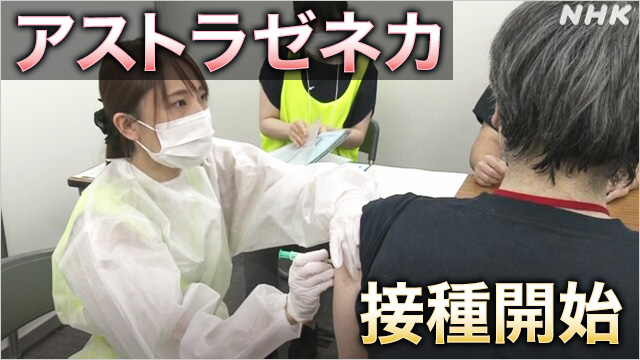AstraZeneca's new coronavirus vaccine, which was added to the official vaccination, began to be vaccinated in some local governments from the 23rd.
It has been reported that there is a very rare risk of thrombosis after vaccination with this vaccine, but what is the actual situation?
Inoculation started today <Osaka>
The "Shiromi Hall" in Chuo-ku, Osaka is operated by a staff of 50 people such as doctors and nurses, and those who have made reservations in advance are divided into three booths and receive inoculations from doctors after being interviewed by doctors. I did.
At this venue, 540 people will be inoculated every day until the 5th of next month, but the reservation frame for this week has been filled and reservations will be accepted from the 23rd for next week.
From next week, Osaka City will set up a second mass inoculation venue in the city to strengthen the inoculation system.
A 64-year-old woman who received the vaccination said, "My husband had already vaccinated, but I could not make an appointment. I was relieved to be vaccinated."
A 49-year-old man said, "There is some negative information about the AstraZeneca vaccine, but I wasn't particularly worried because it was approved by the government and used in other countries. I just wanted to hit it quickly." Was there.
Request the establishment of at least one inoculation site in the prefecture
The AstraZeneca vaccine was added to public vaccinations on the 3rd of this month, and the Ministry of Health, Labor and Welfare is calling on prefectures to have at least one vaccination site.
Vaccines have been delivered to prefectures sequentially from the 16th of this month, and according to the Ministry of Health, Labor and Welfare, vaccination has started in some local governments such as Osaka City and Kawaguchi City, Saitama Prefecture from the 23rd.
Since AstraZeneca vaccine is said to have a risk of causing blood clots in extremely rare cases, in principle, it is not supposed to be vaccinated under the age of 40 based on overseas vaccination cases
. Those who are allergic to the ingredients and
those who have already been vaccinated with AstraZeneca overseas are
eligible.
On the other hand, a research group of the Ministry of Health, Labor and Welfare has started a survey to investigate side reactions after inoculation from the 21st, and will publish the data regularly.
Risk of thrombosis What is the reality?
While the AstraZeneca vaccine has been shown to be effective, it has been reported to be at risk of thrombosis in very rare cases.
Thrombosis is a disease in which blood vessels are clogged with blood clots and blood clots, but we have compiled information on how many people have become.
1. People with thrombosis In England ...?
The AstraZeneca vaccine began in January 2021 in the United Kingdom and elsewhere.
By August 11, 2021, of the 24.8 million people who received at least one dose of this vaccine in the UK, 412 had thrombocytopenia with thrombocytopenia, according to a UK regulator report. Of these, 73 died.
The frequency is 14.9 per 1 million inoculations, and most of them occur after the first inoculation.
2. What is the frequency of blood clots by age group?
The frequency of blood clots is
▽ 20.2 cases per 1 million inoculations between the ages of 18 and 49
▽ 11 cases per 1 million inoculations over the age of 50, which means that the
younger generation is more frequent.
Currently, the UK is targeting AstraZeneca vaccines for people over the age of 40.
3. Where blood clots are clogged There are many cases of cerebral veins
The Japan Stroke Society and the Japan Thrombosis Hemostasis Society have compiled a guide for physicians on thrombosis that occurs after AstraZeneca vaccination.
According to this, the relationship between AstraZeneca vaccine and thrombosis has not been clarified yet, but it is pointed out that antibodies may be involved because it is accompanied by thrombocytopenia.
There are various places where blood clots are clogged, such as the brain, heart, and blood vessels in the legs, and reports from overseas indicate that cerebral veins are often clogged.
4. How do you notice?
Symptoms when testing
The following are some of the symptoms of suspected thrombosis testing:
▽ Disorders of consciousness
▽ Paralysis on one side of the face
▽ Speech disorders
▽ Visual disorders
▽ Severe headaches and abdominal
pains ▽ Pain in the legs and chest, etc.
5. How do you notice?
Estimated medical institution consultation
According to Professor Teruyuki Hirano of Kyorin University, who chairs the corona countermeasure team at the Japan Stroke Society, the guideline for seeing a medical institution is when you have the following symptoms.
▽ Severe headache, abdominal pain, chest pain, etc.
▽ If the pain lasts for hours or days,
etc.
▽ Nausea
▽ If you have symptoms such as seizures or cramps, you
need to see a doctor (inoculation). From 4 days to 1 month).
However, headaches and nausea may occur in addition to thrombosis, and in the case of thrombosis, it is unlikely that any symptoms will occur within 3 days of inoculation.
The guide also summarizes treatment methods, and according to Professor Hirano, a system is in place to provide appropriate treatment, which is well known mainly in stroke hospitals.
6. Expert "Thrombosis fairly infrequently outweighs the benefits of prevention"
Atsuro Hamada, a specially appointed professor at Tokyo Medical University who is familiar with vaccines, said, "Thrombosis after vaccination with AstraZeneca is fairly infrequent, and it is thought that the benefits of preventing the new corona will outweigh the benefits of preventing the new corona if the age group is limited. Considering this, it is necessary to promptly inoculate people in their 40s and 50s who have not been vaccinated, but since the distribution of Pfizer and Moderna vaccines is stalled, the third vaccine is AstraZeneca. It makes sense to add it as an option. "

